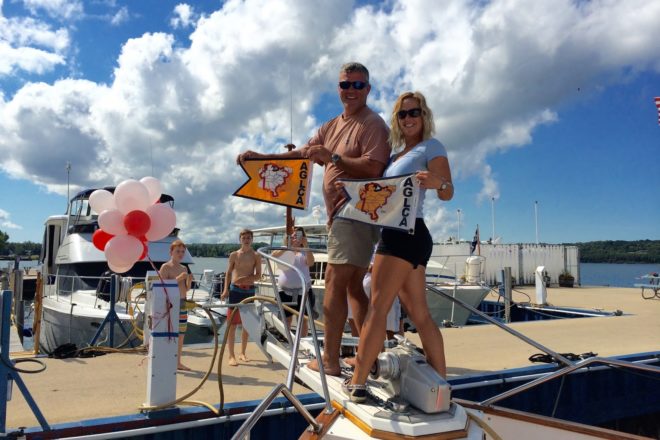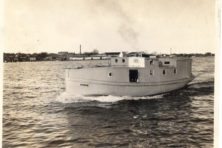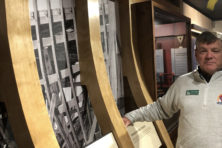Maritime Ambassadors
- Share
- Tweet
- Pin
- Share

Local harbor hosts stand ready to help Loopers
Ben and Jane Stephen of Egg Harbor enjoyed circumnavigating the eastern United States so much that they want to repeat the feat and also enjoy helping others who make the attempt.
Not long after their leisurely, 13-month, 6,000-mile journey through the Great Lakes, river system, Gulf of Mexico and Intracoastal Waterway in 2015-16, Ben, a retired nuclear power plant worker, offered to become Door County’s host for boaters for the American Great Loop Cruisers Association (AGLCA).
As the local host, Ben finds Loopers as they arrive in Door County harbors and marinas. He checks to see whether they’re OK and provides them with information about fuel, boat supplies, food, entertainment and attractions within walking distance or near the various docks. His services extend into October for Loopers who are completing trips or making a later start southward so they can enjoy the fall colors and a little less traffic.
Great Loop participants stay in contact with one another along their journeys to alert each other to, for example, potential hazards, upcoming commercial barge traffic and the lack of available dockage at certain locations, or just to arrange meetings and parties. From land, Ben said he offered his volunteer services primarily to help alleviate concerns or fears that Loopers might have about navigating the Wisconsin side of Lake Michigan.
Jane said most people they met during their Great Loop trip had a lot of fear for their safety on the Great Lakes, but that’s the opposite from her apprehension. Both she and Ben are comfortable with the Great Lakes, but not so much traveling around commercial barges in the Illinois River and through the canal system into Tennessee and Alabama.
“When we got down to the river system, [Jane] said to me, ‘Gosh, I wish I could be the person before we got into the river system who said, “Hey, relax, everything is going to be fine,”’” Ben said.
“I was definitely afraid,” Jane said. “I was thinking it was going to be a trip where I was by myself and we were in the middle of nowhere, and that couldn’t have been further from the truth. We were around a bunch of people all the time. Meeting people and becoming friends with them became a huge bonus of the trip.”
Jane said people warned them that during a yearlong trip, they were bound to run into a major problem. A new engine did go bad on their boat, prompting an extra month’s stay in the Florida Keys, and they did hit a log once in the waterway north of Mobile, Alabama. They also ran aground briefly at a silt-bottomed creek mouth in Florida, but fellow boaters quickly helped.
“We just had another boat go by and throw us a bit of a wake to get us off of it, and we were all good to go,” she said.
Through all of those experiences, the Stephens didn’t think anything that happened was severe, and in all cases, they and their boat were fine.
Ambassadors for the Wisconsin Side
More Loopers tend to stay close to the Michigan side of the lake, where waves can cause concerns even for experienced ocean boaters and sailors. But during the late summer and fall, prevailing northwest winds tend to cause more chop near Michigan than Wisconsin, Green Bay and Door County, Ben said.
Lake Michigan has shorter, choppier waves than the ocean. The shorter waves when it’s rough can make for repeated tilting up and slamming down at the bow.
“It’s very uncomfortable, and it’s just intimidating to people,” he said.
At an AGLCA conference Ben spoke at in Norfolk, Virginia, as well as online, he has talked to first-time and repeat Loopers about things to do around Door County and in Wisconsin, and where boaters can cross the lake.
Jane said she loved spending most of 13 months exploring America.
“Every stop became my favorite,” she said. “We compiled a list of places we enjoyed. When we do the Loop again, we highlighted places where we’re going to spend more time.”
They timed longer legs of the journey when it’s safest, and they traveled and docked with groups of boats on the Loop during difficult portions of their journey, such as a Gulf of Mexico crossing from the Florida panhandle to the Clearwater area, or 250 miles on the Mississippi River between the Illinois and Ohio rivers.
“Usually, they’ll do a 180-mile stretch and leave together with five boats for safety and backup,” Ben said, referring to a route skirting the Big Bend on the Gulf of Mexico. “We went from Panama City to Clearwater. We left at 10 am, six of us, and got to Clearwater at 11 am the next day – 240 miles and 24 hours [including a time change].”
Loopers tend to spread out and do their own thing when they get to Florida. The Stephens enjoyed some time on the open water around Florida in their Grand Banks 42 motor yacht. (They started out in a 1979 model and traded during the trip for a modernized, 1998 boat with stabilizers and a queen bed instead of singles.) They also made a few stops off the beaten path.
“From Clearwater, we went back north to Tarpon Springs,” Ben said. “My wife is Greek, and it has a big Greek population – famous for sponge diving there – a lot of good food, very nice people. We really enjoyed that.”
The Stephens continue to take long trips on their 42-foot cruiser, such as a planned trip all the way around Lake Superior. Until their next Loop trip at an unspecified date in the future, Ben watches online apps such as Nebo. In early October, he found Loopers around Algoma and Sturgeon Bay who had registered their cell phones on the mapping software.
“There are plenty of people who have done it more than twice, and they really enjoy the lifestyle,” Ben said. “For some, it’s a bucket-list item. They buy a boat; they do the Loop; they complete it; they put the boat up for sale, and that’s it – they’re done.”
Traveling the county, he looks for boats flying AGLCA flags: white with a yellow map of the eastern U.S. for first-time Loopers, gold for those who’ve completed the journey, and platinum for repeat travelers. He’ll “knock on the boat” to see whether the Loopers need any help, information or guidance.
“It was so nice to hear a knock on the boat hull, and Ben was there,” said seventh-year AGLCA director Kim Russo, referring to the visit she had from him when she was in Sturgeon Bay this September, enjoying her first full trip on the Loop.
“They’re extremely valuable,” Russo said of the Stephens and the roughly 600 other harbor hosts. “It gives our members a point of contact and a friend.”
Ben said he can always find a friend in a Looper, whether it’s someone in a million-dollar boat or a couple economizing with a small sailboat and an engine that barely sips diesel.
“It’s an automatic, ‘Hey, we’ve got a Looper,’” he said. “You’re immediate family.”


